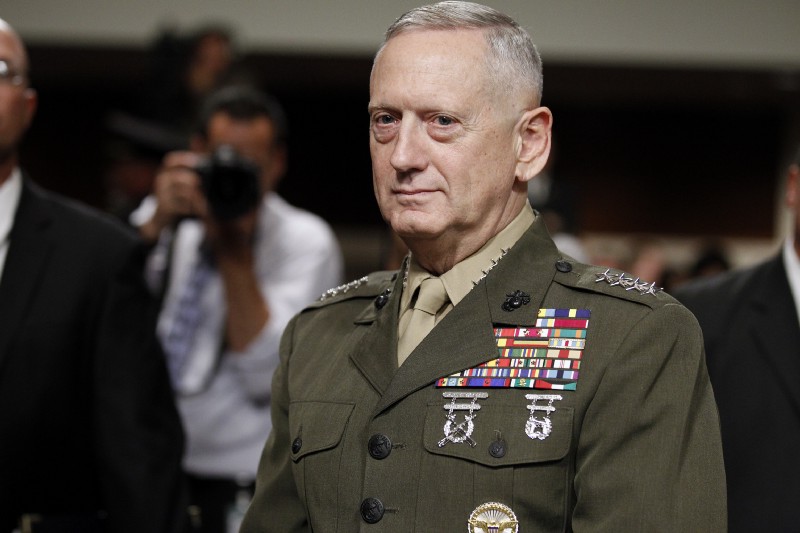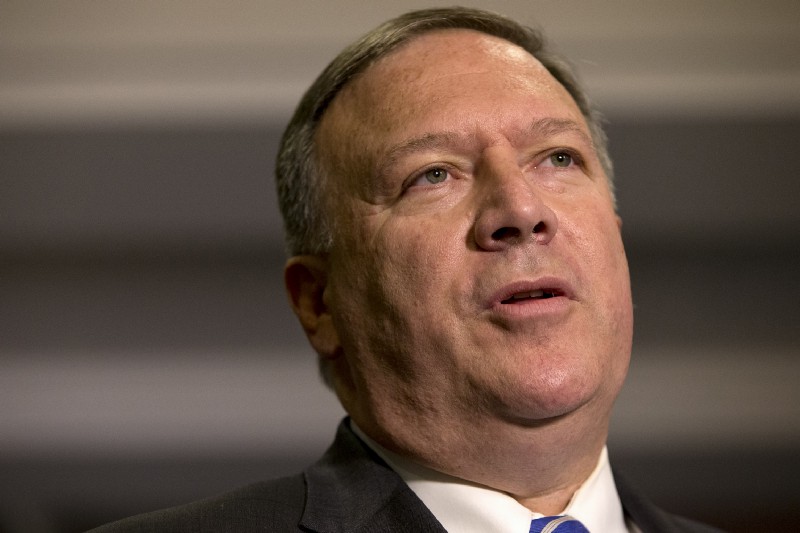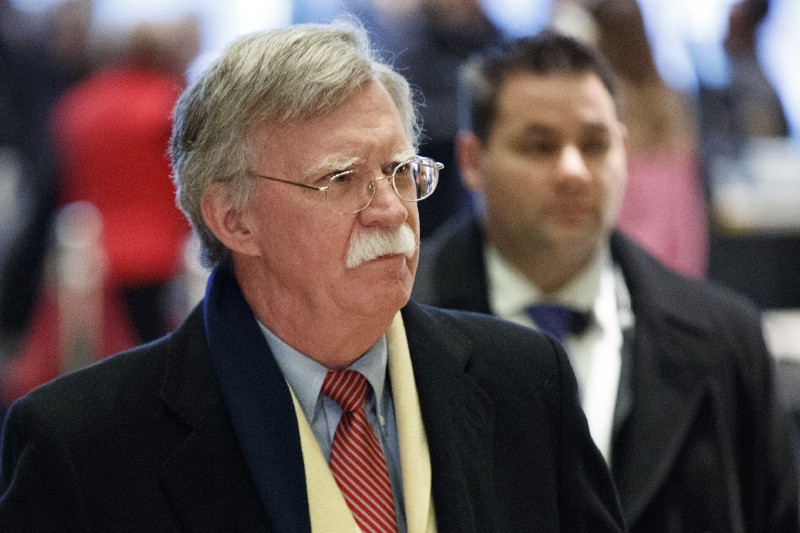Based on who he’s surrounded himself with, it’s clear that Donald Trump is gunning for Iran.
The president-elect’s posture toward the country has been largely incoherent. Through his campaign and the ensuing presidential transition, he has called for dismantling the Iran deal, renegotiating it, and even enforcing it moving forward. He has called for doing business with Iran (which is not currently allowed under U.S. sanctions), and once called for both strengthening and eliminating sanctions over the course of a single interview. Perhaps most notably, in August, he made up an entire news story on Iran.
But where Trump is all over the map, his foreign policy team is remarkably consistent. His top diplomatic and national security nominees would push the United States toward a more hostile relationship with Iran.
Secretary of Defense-designate: James Mattis

Retired Marine Corps Gen. James Mattis, nicknamed “Mad Dog,” is Trump’s choice for secretary of defense — and a major hawk when it comes to Iran.
Politico recently published a great piece on Mattis’ “33-year grudge against Iran.” From the article:
Mattis’ Iran antagonism also concerns many of the Pentagon’s most senior officers, who disagree with his assessment and openly worry whether his Iran views are based on a sober analysis or whether he’s simply reflecting a 30-plus-year-old hatred of the Islamic Republic that is unique to his service. It’s a situation that could lead to disagreement within the Pentagon over the next four years — but also, senior Pentagon officials fear, to war.
“It’s in his blood,” one senior Marine officer told me. “It’s almost like he wants to get even with them.”
At an event in April at the Center for Strategic and International Studies, a centrist think tank in Washington, D.C., Mattis called Iran the greatest problem in the Middle East.
“The Iranian regime, in my mind, is the single most enduring threat to stability and peace in the Middle East,” he said. “For all of ISIS and AQI’s — AQ — al-Qaida’s mention everywhere right now, they’re an immediate threat. They’re serious. Certainly Assad’s Syria and what it’s spewing out is a very serious threat. The Palestine-Israel issue continues to bubble. But nothing, I believe, is as serious in the long-term enduring ramifications in terms of stability and prosperity and some hope for a better future for the young people out there than Iran.”
In the speech, he admitted that it may be too late to dismantle the Iranian nuclear agreement, but spent the majority of his time arguing against it anyway. He ignored the fact that since taking effect in January, the deal has led to Iran dismantling thousands of centrifuges, eliminating 98 percent of its uranium stockpile, limiting uranium enrichment and R&D, and removing the core of its Arak heavy water reactor and filling it with cement.
The speech is worth listening to in full to understand exactly how Mattis thinks about Iran. He calls Iran’s nuclear program a “nuclear weapons program,” refers to the Iranian government as “not a nation-state [but rather] a revolutionary cause devoted to mayhem,” and says a January dispute in which U.S. sailors entered Iranian waters and were released peacefully was not “a win on the United States’ side.” At one point, Mattis even claims it must be “happenstance” that ISIS hasn’t attacked Iran yet (even though the Iranian government announced it prevented a large-scale ISIS attack in Tehran in July) and implies that ISIS — a militant group which views Shia Muslims, the majority of the Iranian population, as heretical — must be working with the Iranian government.
CIA director-designate: Mike Pompeo

Rep. Mike Pompeo (R-KS), Trump’s choice to head the CIA, is another notable hawk on Iran.
Pompeo was not just an ardent opponent of the Iranian nuclear agreement, but of Iran’s right to enrich uranium in general. In February 2015, while negotiations for the deal were still underway, Pompeo was one of three Republican congressmen who applied for Iranian visas to monitor legislative elections, inspect three nuclear sites, and meet with Americans then held in Iranian prisons. (The Iranian Foreign Ministry, unsurprisingly, rebuffed the visa request.)
After the Iran deal was announced, Pompeo published an op-ed in the National Review saying that Obama “placated and even incentivized extremist Muslims” during his presidency. He argued that the Iran deal “strengthens Muslim extremists,” and urged fellow Congress members to vote against it.
In the fall of last year, Pompeo decried a U.S. settlement with Iran resolving an outstanding claim in an international tribunal at The Hague. The Hague ruled that the United States had to return money it had received from Iran to purchase military equipment before the 1979 Revolution, as the order was never fulfilled. Pompeo decried the settlement as proof that the Obama administration “laundered” money to Iran.
After Trump’s victory in November, Pompeo voted to extend sanctions on Iran and tweeted that he looked forward to rolling back the Iran deal.
https://twitter.com/RepMikePompeo/status/799266269853863937
National Security Adviser-designate: Michael Flynn

Retired Lt. Gen. Michael Flynn, the former Director of the Defense Intelligence Agency under President Obama, is a notorious Islamophobe and Trump’s pick for National Security Adviser.
Flynn often tweets about the war on “radical Islam” — a term which even former FBI and CIA officials have admitted does more harm than good by stoking anti-Muslim bigotry and xenophobia.
Radical Islam must be defeated: "Tolerating periodic mass attacks on American and allied civilians is simply not an option." PC kills.
— General Flynn (@GenFlynn) June 13, 2016
In February, he tweeted that fear of Muslims is “rational.”
Fear of Muslims is RATIONAL: please forward this to others: the truth fears no questions… https://t.co/NLIfKFD9lU
— General Flynn (@GenFlynn) February 27, 2016
In April 2015, he appeared on Fox News and said, “I’ve been at war with Islam, or a, or a component of Islam, for the last decade.” Later that year, he called Islam “a political ideology based on a religion.”
Unsurprisingly, this attitude has also extended toward Iran. In July, he published an op-ed in the New York Post saying the United States is in a “global war,” and that Iran — alongside al Qaeda, the Taliban, and ISIS — is one of its enemies:
“We’re in a global war, facing an enemy alliance that runs from Pyongyang, North Korea, to Havana, Cuba, and Caracas, Venezuela. Along the way, the alliance picks up radical Muslim countries and organizations such as Iran, al Qaeda, the Taliban and Islamic State.
That’s a formidable coalition, and nobody should be shocked to discover that we are losing the war.
If our leaders were interested in winning, they would have to design a strategy to destroy this global enemy. But they don’t see the global war. Instead, they timidly nibble around the edges of the battlefields from Africa to the Middle East, and act as if each fight, whether in Syria, Iraq, Nigeria, Libya or Afghanistan, can be peacefully resolved by diplomatic effort.
This approach is doomed. We have real enemies, dedicated to dominating and eventually destroying us, and they are not going to be talked out of their hatred. Iran, for example, declared war on the United States in 1979 — that’s 37 years ago — and has been killing Americans ever since. Every year, the State Department declares Iran to be the world’s primary supporter of terror. Do you think we’ll nicely and politely convince them to be good citizens and even (as President Obama desires) a responsible ally supporting peace? Do you think ISIS or the Taliban wants to embrace us?”
Like others that Trump has surrounded himself with, Flynn is also against the Iranian nuclear agreement. In July 2015, shortly after the Iran deal was announced, he told Al Jazeera’s Mehdi Hasan that it was based on “really false assumptions” and that it would “absolutely” lead Iran to obtaining a nuclear bomb in less than 10 years.
Iran is “intent on having a nuclear weapon,” Flynn said, although Hasan pointed out that the U.S. intelligence community hasn’t come to the same conclusion.
Former UN ambassador John Bolton

John Bolton, a former U.S. ambassador to the United Nations under President George W. Bush, advised Trump on foreign policy during the campaign and was a contender to be his nominee for Secretary of State — an honor that eventually went to Texas oil magnate Rex Tillerson. A notable Iraq War hawk, Bolton has also repeatedly argued for military confrontation with Iran.
Shortly after Trump’s victory, Bolton said that regime change is the “only long-term solution” to dealing with Iran. “The ayatollahs are the principal threat to international peace and security in the Middle East,” Bolton told Breitbart News Daily, a radio program from the far-right website pushing white nationalism. “Now, their ouster won’t bring sweetness and light to the region, that’s for sure, but it will eliminate the principal threat.”
“I think the people of Iran would long for a new regime,” he added, oblivious that this was the same reasoning used to invade Iraq in 2003 — an invasion that he still defends today.
In the past, Bolton has repeatedly made sensationalized predictions about Israel attacking Iran in just a few weeks. He has argued over and over and over again that that bombing Iran — whether carried out by Israel or the United States — is the only way to prevent the country from obtaining a nuclear weapon.
Bolton also has ties to the Mujahedin-e-Khalq (MEK), a cult-like group that wants to overthrow the Iranian government — and which, until 2012, was also classified as a terrorist organization by the U.S. government. The original State Department designation was due to a series of MEK attacks on U.S. military personnel, businesses, and civilians in Iran in the 1970s and 1980s — and the MEK’s eventual delisting was due in large part to a multi-million dollar campaign, during which journalists and politicians supporting the group received lofty checks. Bolton repeatedly spoke at MEK conferences, even when it was still a designated terrorist organization in the United States. He previously told the Financial Times he did not see his being paid “as an issue.”
Bolton did not disclose how much he was paid, but in a piece about MEK-paid speakers in general, the Financial Times reported: “Several people familiar with the MEK’s offers described a sliding pay scale of $20,000 to $100,000 per speech, plus travel costs, and that four-speech packages were common.”
Many of the other people Trump has nominated to his cabinet are also against the Iranian nuclear agreement, including Jeff Sessions (Attorney General), Rick Perry (Secretary of Energy), Ben Carson (Secretary of the Department of Housing and Urban Development), Nikki Haley (U.S. Ambassador the United Nations), Tom Price (Health & Human Services Secretary), and Ryan Zinke (Secretary of the Interior).
